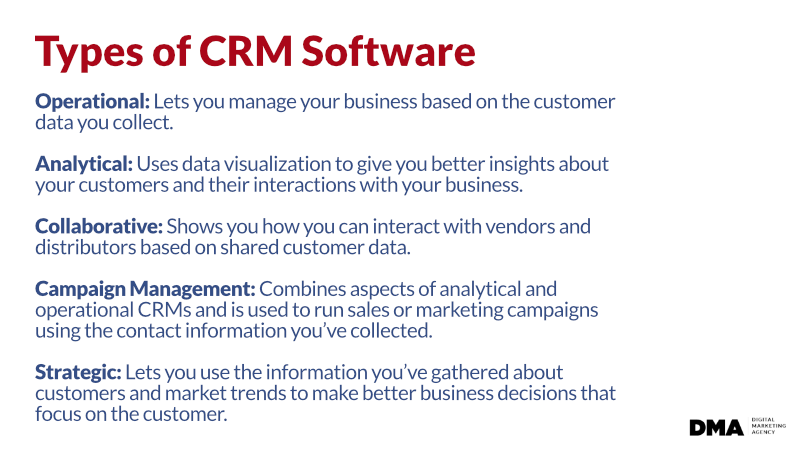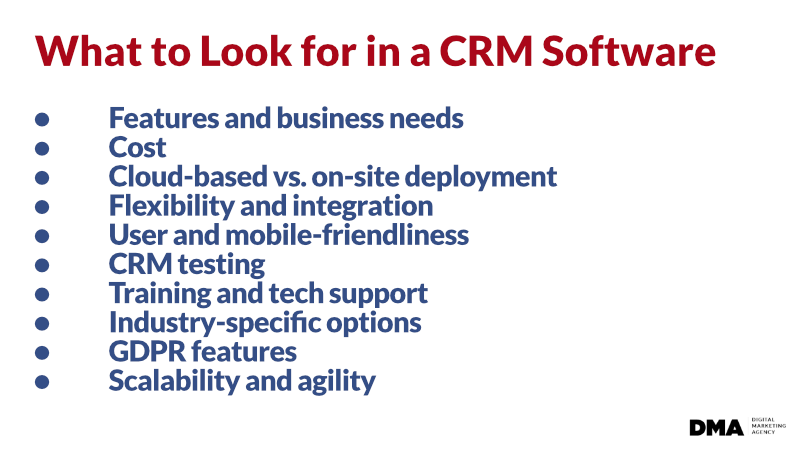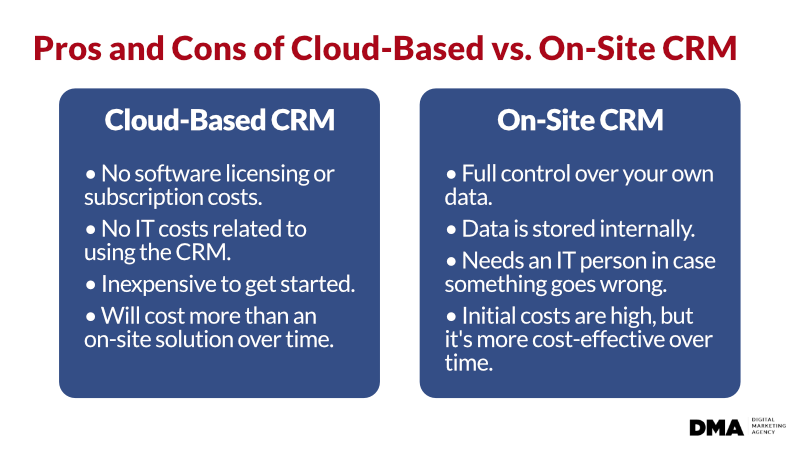SEO
Free SEO Analysis
SEO Services
Content Marketing Services
Local SEO
Link Building Services
Specialized SEO Services
PPC
REPUTATION MANAGEMENT
Free Reputation Management Analysis
Reputation Management Services
Review Management Services
Specialized Reputation Management Services
CEO Reputation Management
Brand Enhancement
Business and Directory Listings
Comprehensive Reputation Management Audit
SOCIAL MEDIA
Free Social Media Analysis
Specialized Social Services
WEB DEVELOPMENT
Free Website Analysis
Web Design Services
Mobile Development Services
Website Maintenance Services
Specialized Development Services
MARKETING AUTOMATION
Free Marketing Automation Analysis
Specialized Marketing Automation Services
Comprehensive Marketing Automation
INDUSTRIES
ABOUT DMA
Digital Marketing
How to Choose the Best CRM Software for Your Business
Request a quote
Its Fast, Easy & Free
Executive Summary
- Without a CRM software, keeping track of your customers and leads can be hard if not impossible.
- Your business and business needs are unique. This means that you need a CRM solution with the features that work for your business and what you want to accomplish.
- Don’t commit to a CRM before you have a chance to test it. And, when you’re testing it, try to break it.
Building and maintaining relationships with potential customers and current customers is just about the most important thing you can do as a business. But without a CRM software, keeping track of your customers and leads can be hard if not impossible.
A Customer Relationship Management (CRM) software helps you and the rest of your team stay on top of how you’re communicating with each customer and lead.
Customer satisfaction relies heavily on how your customers perceive their treatment by your business, so it just makes sense to have a system for tracking your interactions to ensure that you’re providing personalized messaging.
In this article, we’re going to show you how to choose the best CRM software for your business so you can manage your sales team communications, manage leads, and build personalized marketing campaigns.
We’ll cover what you need to look for before committing to a CRM software across ten key areas. But first...
What Is CRM Software and Why Is it Important?
CRM software lets businesses document and manage customer data and interactions.
That’s it.

Of course, there are five different types of CRM software to choose from:
Operational:
Lets you manage your business based on the customer data you collect.
Analytical:
Uses data visualization to give you better insights about your customers and their interactions with your business.
Collaborative:
Shows you how you can interact with vendors and distributors based on shared customer data.
Campaign Management:
Combines aspects of analytical and operational CRMs and is used to run sales or marketing campaigns using the contact information you’ve collected.
Strategic:
Lets you use the information you’ve gathered about customers and market trends to make better business decisions that focus on the customer.
How to Choose the Best CRM for Your Business
Regardless of the business you’re in, managing customer relationships is vital to your success. And, hands down, the best way to manage those relationships is with CRM software.
CRM software helps you strengthen your relationships with customers and leads, identify new products, and even generate new leads.
But how do you choose the best CRM software for your business?
There’s no shortage of CRM options available and it can be really hard to find the right one. Your business is unique, right? It makes sense that the right CRM for you depends on your industry, business size, and more.

In this section, we’ll take you through ten important factors to consider when evaluating your CRM software options.
Features and Business Needs
Your business and business needs are unique. This means that you need a CRM solution with the features that work for your business and what you want to accomplish.
CRM software often comes with tons of functions and features that appeal to a wide range of businesses. And, more often than not, they have a price tag to match!
But, what if you don’t need many of the features included? Or, what if you don’t need them right now, but you will as you grow?
What you need is CRM software that offers different options that you can use (and pay for) as you grow instead of giving you everything that anyone could ever need to run a Fortune 500 company right out of the gate.
Steer clear of “one-size-fits-all” CRM solutions and evaluate the features and functionality based on what you really need.
Cost
Do you have a couple thousand every month to pay for CRM software? If you’re a startup or small business, the answer is probably no.
So, if that CRM software is out of your budget, you don’t need to consider if further.
Instead, focus on finding the best CRM software you can that meets your business needs and won’t cost you more than you can afford to pay.
If you’re trying to cut costs, you may find that an all-in-one CRM software that includes marketing automation and customer support is the right choice for you.
You should also look at the CRM’s pricing model. If you’re tight on money, you may have to pay month-to-month, so if the CRM you’re eyeing doesn’t offer monthly payments, keep looking.
There are also those hidden costs to be aware of, too. For example, a CRM service could offer certain features for a price that looks exactly right, but then you find out that they charge a monthly maintenance fee based on the number of contacts you have.
Suddenly, that affordable solution is an out-of-control money pit.
Cloud-Based vs. On-Site
Do you want a highly mobile cloud-based CRM or will you only allow on-site use? Neither option is perfect.
With cloud-based CRM software, you don’t have to maintain a server or have any technical knowledge. Just log in from a browser and you’re ready to rock. All the information is hosted on the provider’s server, which means you have access to it wherever you are.
Well, wherever you are with an internet connection.
With cloud-based CRM software, you have to be online for it to work. That means if your internet connection goes down you won’t be able to access your customer information.
With on-site CRM software, you purchase the software and load it on your local computers or server. While this likely means no ongoing subscription charges, you’ll need access to IT people in case something goes wrong.

Choose a CRM software that is flexible and can grow with your business.
Flexibility and Integration
Your CRM software should give you a complete view of your customers (both past and present) and leads, including contact information, demographics, what they’ve purchased, and profit margins.
This data is important when you’re creating new marketing campaigns. You can use it to create highly-targeted messaging for your landing pages, omnichannel marketing campaigns, email marketing, to score and quality new leads, and more.
As such, you’ll want to make sure that the CRM software you choose is compatible with the marketing systems you already use.
If there’s one integration that doesn’t work for an otherwise perfect CRM solution, look into third-party platforms like Zapier and IFTTT to see if there’s an easy way to create that last integration.
Remember, your CRM solution isn’t going to be a stand-alone system—it needs to work with the tools you already use to help you streamline your marketing efforts.
The integrations you need to look for could be anything:
Accounting and HR software
Billing and eCommerce platforms
Lead generation software
Email marketing provider
...and others
In addition to integrations and compatibility, you’ll want to make sure that it’s easy to get your existing contact information into your new CRM. Check to see if you can import and export data from the CRM you’re considering.
User and Mobile Friendliness
If your CRM isn’t usable by the people who need to use it where they need to use it, it’s worthless.
It’s true that CRM software is often very complex; it tracks all of your customers and leads information and interactions, after all.
Because of this, some CRM software comes with a steep learning curve.
Look for CRM software that is intuitive and offers a simple, easy to use interface. This will help with adoption. If the software is too hard to learn and use, some of your employees will give up and simply refuse to use it.
This reduces alignment, efficiency, and even data integrity.
In addition to user-friendliness, you need to choose a CRM that’s mobile-friendly. It’s likely that your team meets with people face-to-face or takes calls from places that might not be your office, right?
Choose a CRM software that makes it easy for your team to use when they’re not at their desk. This could mean a cloud-based solution or an on-site CRM software that offers easy synchronization.
CRM Testing
Don’t commit to a CRM before you have a chance to test it. And, when you’re testing it, try to break it.
You want to make sure that the CRM software you choose will stand up to whatever you throw at it, so be merciless.
Taking the time to test the software thoroughly upfront means fewer surprises about its functionality once you’re using it for your business.
Training and Tech Support
What happens after you buy this particular CRM software? Do you have to set it up on your own? Is there training or tech support provided? What does that entail?
Most CRMs these days are pretty straightforward, fortunately. If you’re just using basic features, you probably could just poke around and begin to understand how to use it.
But, if you’re using a CRM software with multiple departments and integrations, you’re going to need training and support.
Industry-Specific
Your industry can also make a difference in what CRM software is best for your business. If you are in a specialized industry, you’ll want to check out any industry-specific CRMs there are.
Finding a CRM that is tailored for your industry from a company staffed with experts in your industry can save you a ton of time. Plus, you’ll be able to realize the benefits of your CRM software sooner.
GDPR Features
If you’re located in the EU, it’s vital that GDPR functionality is built into your CRM software. This will help you manage customer data more efficiently and keep you out of trouble when you’re creating marketing new campaigns.
What do GDPR features include?
For starters, you need to be able to remove customers from your database at their request and send them a confirmation that they’ve been deleted.
You also need to have the capability to send a report of the data you store on a customer if they ask for one. This isn’t just a blanket “we collect cookies” statement, but instead a report for each customer, individually, that details the information you have on them.
Finding a CRM software that offers a one-click solution to these types of requests will save you a lot of time since you won’t have to manually remove your customer’s data from multiple databases used by all of your departments.
Without features that specifically address GDPR concerns, you risk being out of compliance.
Scalability and Agility
It’s a safe bet that you want your business to grow over time, right? That means you’ll need a CRM solution that can grow with you.
Even if growth isn’t your ultimate goal, you’ll still want to make your business processes more efficient. The right CRM can help with that, too.
Finding a CRM software that is scalable and agile isn’t hard. You just need to know if the CRM solution can be upgraded and if it’s adaptable to fit different business needs.
It can be a bit of a balancing act to find a CRM software that is right for your business now and in the future, but consider what your business might look like in a few years. If the CRM can handle your vision for the future while providing the functionality you need right now, it’s a keeper.
Conclusion
Your Customer Relationship Management system plays a huge role in the success of your business. And, no matter the size of your company, your industry, or your budget, there’s a CRM software out there that’s right for you.
By understanding the key areas we’ve covered here, you’re well on your way to choosing the best CRM software for your business.
Once you’ve found the right CRM software to make managing your customers and leads a breeze, you’re probably going to want to generate even more leads to keep your sales funnel full.
Digital Marketing Agency is here to help! We offer award-winning conversion optimization services to ensure that every part of the sales process is optimized to ensure that no lead is left in limbo. Contact us today for a free quote!
Our Sales team
We are available for you every time
